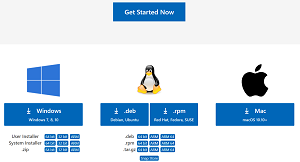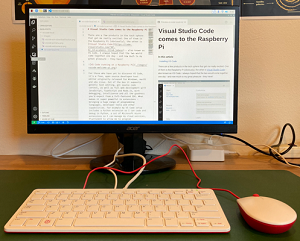News
Raspberry Pi Officially Embraces Visual Studio Code, Telemetry and All
The Raspberry Pi Foundation has officially embraced Microsoft's open source Visual Studio Code editor, known for its cross-platform capabilities enhanced by a vast selection of extensions.
Of course, it has long been possible to use VS Code on a Raspberry Pi, a small single-board computer especially popular with hobbyists but which is also put to professional use. Microsoft's own Scott Hanselman pointed this out four years ago in a post titled "Building Visual Studio Code on a Raspberry Pi 3," which he followed up a year ago in the article "How to install Visual Studio Code on a Raspberry Pi 4 in minutes."
So the big news last week was that it's now much easier for Raspberry Pi developers to use VS Code, as the editor is now available via Raspberry Pi OS apt , a command-line utility for installing, updating, removing and managing deb packages on Ubuntu, Debian and related Linux distros. That means it can be installed from the Raspberry Pi Terminal with the following commands:
sudo apt update
sudo apt install code -y
That obviates the workarounds and machinations needed by Hanselman's and other approaches.
Or, as one commenter on the development-oriented Reddit social site put it, "It's just 'official' now."
 [Click on image for larger view.] The VS Code ARM Options for Debian Are Front and Center (source: Microsoft).
[Click on image for larger view.] The VS Code ARM Options for Debian Are Front and Center (source: Microsoft).
Here's how Microsoft's Jim Bennett, on the Developer Relations team at Microsoft, explained the news in a Feb. 12 blog post authored by Ashley Whittaker on the Raspberry Pi Foundation site.
There are a few products in the tech sphere that get me really excited. One of them is Raspberry Pi (obviously), and the other is Visual Studio Code or VS Code. I always hoped that the two would come together one day -- and now, to my great pleasure, they have!
I've been hoping for years VS Code would come to Raspberry Pi, and finally it's here. As well as supporting Debian Linux on x64, there are now builds for ARM and ARM64 -- both of which can run on Raspberry Pi OS (the ARM build on Raspberry Pi OS, the ARM64 on the beta of the 64-bit Raspberry Pi OS). And yes -- I am writing this right now on a Raspberry Pi 400 running VS Code!
 [Click on image for larger view.] Using VS Code on a Raspberry Pi to Write About VS Code Coming to Raspberry Pi (source: Jim Bennett).
[Click on image for larger view.] Using VS Code on a Raspberry Pi to Write About VS Code Coming to Raspberry Pi (source: Jim Bennett).
While not earth-shattering news -- since the capability already existed -- the announcement drew criticism from some open source purists who decry the fact that, even though VS Code is described by Microsoft as "open source," it doesn't meet the strict definition of free open source software (FOSS). Many developers and privacy advocates also criticize the usage telemetry that VS Code sends back to Microsoft.
"As Raspberry Pi is mostly targeting children, it is disgusting at best to let microsoft track them. Vscodium [a version of VS Code without the Microsoft telemetry/branding/licensing] would have been much better choice!" read one comment on the post. Another said, "It is time to use another Linux distribution."
Many others, however, applauded the news. Bennett said it excited him for two main reasons: it brings an exceptional dev tool to the Raspberry Pi, and it lets kids share the same development environment as "their grown-ups."
"Imagine the joy of a 10-year-old coding Python using VS Code on their Raspberry Pi plugged into the family TV, then seeing their Mum working from home coding Python in exactly the same tool on her work laptop as part of her job as an AI engineer or data scientist," he said.
Bennett also noted that the aforementioned apt commands may not even be needed to install VS Code for Raspberry Pi developers who use the Pico microcontroller board. "VS Code is installed as part of the Pico setup from the Getting Started guide," he said.
The Linux ARM builds for VS Code were
introduced last October in v1.50, wherein Microsoft announced the editor was available for both ARMv7 and ARM64, stating, "This means you can now officially use VS Code on a Raspberry Pi, Chromebook, and other ARM-based devices!"
Microsoft has lately been pushing to support ARM and ARM64 architectures -- often used in CPUs for mobile devices because of power efficiency and other characteristics -- in other areas, too, such as with its C++ extension for VS Code. In an update last November, the company touted "You can now develop C++ applications on Raspberry Pi with VS Code and Remote-SSH!"
About the Author
David Ramel is an editor and writer at Converge 360.